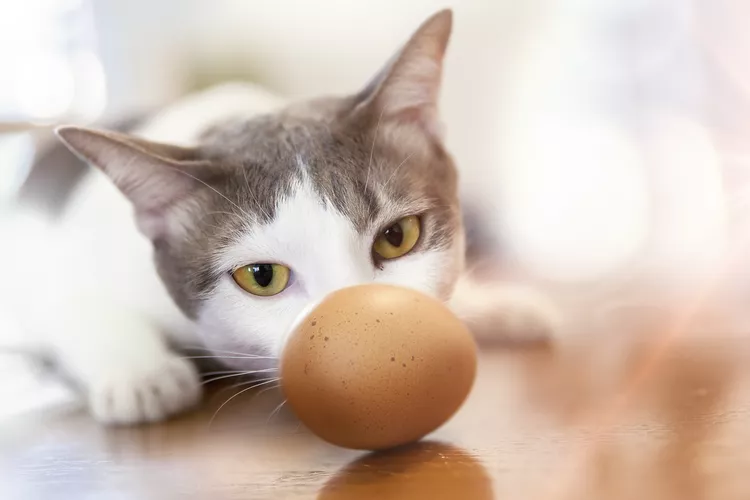Can Cats Have Raw Eggs?

The American Egg Board has never let us forget that eggs are a staple, especially in breakfast food. Plus, they can be prepared a myriad of ways. Does this apply to your cat, though? Can you feed your cat raw eggs, or should you cook them first?
Are Raw Eggs Safe For Cats?
Many proponents of raw feeding in cats tout raw eggs as a great addition to a cat's raw diet because they are packed with protein. They may also believe that cooking the egg will denature the proteins, making them less usable for your cat's body and digestive system.
One of these proteins, called avidin, can actually be harmful when ingested in its raw form. This is because avidin, in its raw form, bonds very tightly to Vitamin B7, also called biotin. Biotin is a water-soluble vitamin, which means it isn't stored in the body as long as fat soluble vitamins. Cats use biotin for protein and fat metabolism. It is also utilized in your cat's adrenal glands, thyroid gland, nervous system, and their skin, fur, and nails. Cats that are routinely fed raw eggs for an extended period of time may start to exhibit signs of biotin deficiency, which may include a shabby hair coat, skin lesions and hair loss, especially on the face and legs, decreased appetite, and diarrhea. Cooking eggs denatures the avidin in the egg white. This means it makes it less likely to lead to biotin deficiency because denatured avidin cannot bind as readily to biotin.
Another risk associated with feeding raw eggs is bacterial contamination. Feeding your cat raw eggs puts them at risk of ingesting live cultures of Salmonella and/or E. coli that may be contaminating the eggs. Both of these bacteria can cause your cat to be very sick. Salmonellosis and Colibacillosis in cats can cause a variety of symptoms, including vomiting and diarrhea, anorexia and weight loss, fever, lethargy, dehydration, abnormal tachycardia (a fast heart rate), and swollen lymph nodes. If left untreated, they both can also lead to a life threatening condition called septicemia. Septicemia is, quite literally, an infection in a cat's blood stream and requires immediate veterinary attention. The Salmonella and E. coli in raw eggs aren't just a concern for your cat. You also could be at risk of Salmonellosis and/or Colibacillosis, either from handling the raw eggs yourself or by contracting it from your cat.
Of course, Salmonella and E. coli is are concerns for raw feeding as well. However, there are some commercial raw diets that undergo a process called high pressure pasteurization that successfully kills any bacteria in the food without having to cook it. If you are thinking about feeding your cat a raw diet, it's definitely something to keep in mind when choosing whether to do home made raw or commercial raw.
Health Benefits of Eggs for Cats
Raw eggs are unsafe for cats to eat, but that doesn't mean that, when properly prepared, they don't provide a nutritious snack for your cat. The proteins and amino acids found in eggs can actually make them a healthy snack option for some cats. Cats, being strict carnivores, need animal protein in their diet, and eggs are believed to be nutritionally complete when it comes to protein.
Dangers of Eggs for Cats
Aside from the dangers of raw eggs, there are considerations before feeding your cat cooked eggs. While the white is protein packed, the yolk contains much more fat. This can not only predispose a cat to obesity, but it can also put a cat at risk of of pancreatitis, a painful inflammation of the pancreas. Diabetic cats may be especially at risk of pancreatitis. The shell can be a source of calcium, but take care in how it is prepared to avoid causing irritation to a cat's mouth or the lining of their gastrointestinal tract.
Additionally, if your cat is otherwise healthy and on a commercial diet, whether raw or traditional, it shouldn't need calcium supplementation. Too much calcium can be detrimental to all of your cat's organ systems, but especially to your cat's kidneys, nervous system, and their cardiovascular system.
How to Feed Eggs to Your Cat
If you want to treat your cat to an egg, the safest way to do so is to boil it or scramble it with no salt or seasonings. If your cat is susceptible to gastrointestinal upset or pancreatitis, feed only the egg white. This will help minimize the ingestion of extra fats that may aggravate your cat's GI tract. Keep in mind that any diet change or new treat can lead to diarrhea or stomach upset. If you do feed your cat the cooked yolk portion, do so only in moderation. One whole egg contains a large percentage of a cat’s daily calorie requirement, so cats should be fed partial eggs as an occasional treat.
Take care if you decide to try to feed your cat eggs. As with most human foods, speak to your veterinarian before giving them a nibble.